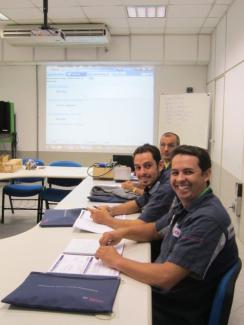Sustainable development
Investment in skills training pays off
 dw
dw
Why do so many medium-sized German companies choose São Paulo as a business location?
There are long-established links. Many companies already have a presence in São Paulo. The legal system is in place, the German chamber of commerce is there, the German Club and the German community in general. This infrastructure is especially beneficial to SMEs that want to enter the market. Notaries, lawyers, tax accountants and other professional service providers understand German companies. Other places in Brazil, however, lack this kind of infrastructure, so companies have to start there from scratch, and that would be more expensive.
What are the major obstacles your clients face in Brazil?
One thing many companies complain about, is the lack of infrastructure – especially outside São Paulo. This applies to roads, power and water supply, sanitation and waste management, for instance. There is also a lack of qualified workers. Red tape and legal uncertainties are also challenges, partly because the laws are unclear. For example, it is currently being discussed to raise the legal working age from 16 to 18. But what are young people supposed to do after leaving school at 16 or 17? Large companies can run skills training workshops for apprentices, but smaller companies usually cannot do so.
If there are too few skilled workers, aren’t companies interested in training young people?
They actually have to train them, because Brazil’s state-run education system does not provide people with the professional qualifications that companies require. You need an appropriately trained workforce to meet the quality standards German products are known for. If someone cannot draft a construction blueprint, she or he normally will not be able to read that kind of document either, and thus will not be able to build the machine correctly. If companies want to sell high-value goods, they need high-quality production, plus high-quality after-sales services. When something doesn’t work properly, they need to send support fast, and only a competent colleague will be up to the task. Moreover, support services are often provided online today. Computers are used to identify the problem, and repair means to fix the software. These are additional challenges, and the staff of small workshops in rural areas must be put in the position to rise to them.
Do companies train people beyond their own need?
Well, it is often hard to retain people with good skills. That is no different in Brazil than anywhere else in the world, so it makes sense to train people beyond one’s own needs. And if mechanics that have been trained by Bosch, the car component manufacturer, later start their own business, Bosch can benefit: they’ll be potential clients.
Is training on the job needed at all levels – for low-skilled workers and university graduates alike?
Yes, it is. The reason is that workers’ knowledge has to match current needs at all levels. In many emerging markets and developing countries, the governmental education system basically delivers theoretical knowledge. In Germany, practical competence is valued as well, and that is something special. Where it is not common to teach practical skills, companies have to assume the responsibility for making sure their employees are capable of rising to their jobs’ challenges.
So Brazil does not link theory and practice in the way that Germany’s vocational training system is famous for?
Well, the SENAI (Serviço Nacional de Aprendizagem Industrial – the national training service for industrial apprenticeship) offers vocational training courses in manufacturing and advanced training programmes for more experienced staff. It is partly controlled by the government and cooperates with universities. But it does not run courses for all economic sectors, and SENAI training is not a general requirement for employment. The great advantage of Germany’s dual system is that the practical part of the training takes place on the job. So far, that is hardly done in most emerging markets and developing countries. Companies that want to invest in these markets have to be enterprising and might want to cooperate with others on training. In India, Don Bosco Mondo, a Catholic outfit, is a good partner. In cooperation with companies, it develops training courses – to the benefit of both low-skilled youngsters and employers.
What role does DEG play in terms of promoting vocational training?
Among other things, we support related efforts in the context of develoPPP.de, the programme with which the German Federal Ministry for Economic Cooperation and Development (BMZ) supports innovative development partnerships with private-sector companies in emerging markets and developing countries. A lot of the funding is used for training and education purposes. Skills training is a huge challenge and rather expensive, so many SME managers hesitate to tackle it in emerging markets and developing countries.
How does develoPPP.de work?
The target group are German and European companies that are interested in sustainable, long-term investments in developing countries and emerging markets. The BMZ provides funding worth up to € 200,000 per project, though not more than 50 % of a project’s total costs at most. Companies can submit proposals in competitions four times a year. Projects go on for up to three years, and they concern all sorts of sectors and issues. Think of a pilot project, or measures to improve environmental performance or boost skills, for example. What matters is the developmental relevance of the proposals. For many SMEs, it is actually quite a challenge to cover 50 % of the costs because that is a lot of money. But if they are serious about a project, they will be willing to pay a price. Their own contribution is an indispensable indication of assuming responsibility.
And what else are you doing apart from develoPPP.de?
We are part of an international initiative called “Let’s Work”. It aims to bring about long-term employment in fair conditions. Last year, for example, we did research on skills gaps. The difference between what companies need and what potential employees are capable of all too often blocks social and economic development. Our report “Bridging the skills gaps in developing countries” assesses a number of companies and shows how they dealt with issues in targeted action concerning workers, the supply chain and local communities (see D+C/E+Z e-Paper 2016/03, p. 6). The publication includes a checklist, so it can help companies to assess their own needs and requirements.
Does DEG support only German companies or also Brazilian companies?
Our mission is to support private-sector investments that serve developmental goals in emerging markets and developing countries, and that includes Brazilian companies. We’d also support Chinese companies in Brazil if they meet our standards – or Brazilian ones in Mozambique, for example. Our job is to support small and medium-sized companies that would not be able to make good ideas come true due to lack of long-term financing. DEG either becomes their shareholder or supports them with long-term loans. Moreover, we cooperate with banks and investment funds in emerging markets and developing countries. We lend them money and help them to improve their risk management, so they become able to serve our SME target group in the best possible way. Our vision is the development of a strong and capable SME sector as we have in Germany. In Germany, 90 % of all companies are SMEs, and SMEs are similarly important pillars of the economies of many developing countries.
Bruno Wenn is chairman of the Management Board of DEG – Deutsche Investitions- und Entwicklungsgesellschaft, which is a subsidiary of Germany’s KfW Banking Group and supports private-sector development in developing countries.
http://www.deginvest.de
Links
DEG: Study: Bridging the skills gaps in developing countries.
https://www.deginvest.de/DEG-Documents-in-English/About-DEG/What-is-our-impact/Bridging-Skills-Gaps_DEG_2016.pdf
Let’s Work Partnership:
https://letswork.org/





